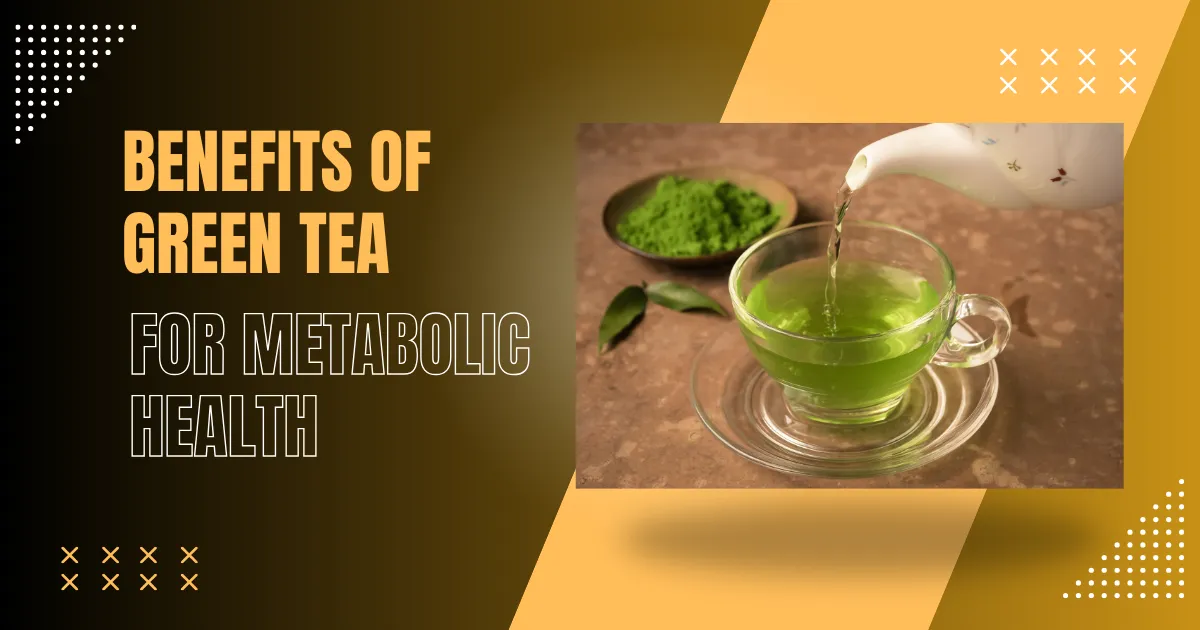Green tea can potentially aid in weight loss, but it’s important to understand how it works and its overall impact. While green tea alone won’t cause significant weight loss, its properties can contribute to an effective weight management strategy when combined with a healthy diet and regular exercise.
- The Role of Green Tea in Boosting Metabolism
- Green Tea and Fat Loss, Particularly Belly Fat
- Appetite Regulation and Green Tea
- Green Tea and Exercise Performance
- Green Tea as Part of a Healthy Lifestyle
- 6. How to Consume Green Tea for Weight Loss
- Conclusion: Green Tea’s Role in Weight Loss
- Green vs. Black Tea for Weight Loss: Which is Better?
- Conclusion: Which Is Better for Weight Loss?
Let’s explore the various aspects of how green tea may support weight loss, backed by scientific research and expert insights.
The Role of Green Tea in Boosting Metabolism
One primary way that green tea may assist with weight loss is by boosting the body’s metabolism. It contains bioactive substances like caffeine and catechins, particularly epigallocatechin gallate (EGCG), which increase fat-burning and energy expenditure.
Caffeine’s Impact
Caffeine, a natural stimulant in green tea, has been shown to enhance metabolic rate and increase fat oxidation. Caffeine stimulates the nervous system, signaling the body to break down fat and use it as energy. Several studies suggest that caffeine can increase the resting metabolic rate by 3–11%, which may lead to more calories burned, even at rest.
Catechins and Fat Oxidation
Catechins, especially EGCG, are potent antioxidants in green tea that may boost metabolism and promote fat breakdown. Studies have found that catechins can increase fat burning, particularly during exercise. In one study, men who took green tea extract before exercising burned 17% more fat than men who didn’t take the supplement.
This increase in fat oxidation helps the body utilize fat stores for energy, making it a potential contributor to weight loss when combined with physical activity.
Green Tea and Fat Loss, Particularly Belly Fat
Several studies suggest that green tea, or its extract, can help reduce body fat, especially in the abdominal area. Belly fat is a hazardous type of fat linked to various diseases, including diabetes and heart disease. Reducing this fat is a significant health benefit.
Research Findings
A study involving 240 people over 12 weeks found that participants who consumed green tea extract significantly decreased their body fat, particularly in the abdominal area. The fat reduction was modest, but it indicates that green tea can support overall fat loss, particularly in the central body.
While the effects may not be drastic, green tea’s potential for reducing dangerous visceral fat (the fat around internal organs) is worth considering as part of a broader weight loss strategy.
Appetite Regulation and Green Tea
Green tea may also regulate appetite, although the evidence is mixed. Some studies suggest it could help reduce appetite, leading to lower calorie consumption. However, other studies have shown no significant effect on appetite, so more research is needed.
Appetite Suppression
Some researchers believe that green tea’s combination of caffeine and catechins may suppress appetite, helping people eat fewer calories throughout the day. One study found that green tea extract reduced the amount of food consumed by participants.
However, these effects are not universal, and appetite control may vary depending on individual factors, such as metabolism, activity level, and genetic predisposition.
Green Tea and Exercise Performance
Green tea has been shown to improve physical performance, which can indirectly support weight loss efforts. The caffeine and catechins in green tea increase energy levels and endurance, making engaging in more prolonged or intense physical activities more accessible.
Increased Fat Burning During Exercise
As mentioned earlier, green tea increases fat burning, particularly during exercise. By enhancing the body’s ability to burn fat as fuel during workouts, green tea can help improve exercise performance, leading to more effective weight loss efforts.
Athletes and fitness enthusiasts may benefit from consuming green tea before workouts. It may enhance stamina, allowing for longer or more intense exercise sessions, leading to more significant calorie burn and fat loss.
Green Tea as Part of a Healthy Lifestyle
While green tea can offer benefits for weight loss, it is essential to recognize that it is not a magic solution. Drinking green tea alone, without any changes to diet or activity levels, is unlikely to lead to significant weight loss.
Importance of Diet and Exercise
To maximize green tea’s potential weight loss benefits, it should be integrated into a comprehensive approach that includes a healthy, balanced diet and regular physical activity. A diet rich in whole foods, such as vegetables, fruits, lean proteins, and whole grains, combined with regular exercise (cardio and strength training), will provide the most effective weight loss results.
Green tea can supplement these efforts by boosting metabolism, improving fat oxidation, and enhancing exercise performance.
6. How to Consume Green Tea for Weight Loss
To reap the potential weight loss benefits of green tea, consistency is key. Here are some tips on how to incorporate green tea into your daily routine:
Drinking Green Tea
- 2 to 3 Cups Per Day: For most people, drinking 2 to 3 cups of green tea daily provides enough caffeine and catechins to support weight loss.
- Avoid Sweeteners: Adding sugar or sweeteners to your green tea can counteract the weight loss benefits, so it’s best to drink it plain or with a squeeze of lemon for added flavor.
- Consume Green Tea Before Exercise: Drinking green tea before exercise can help enhance fat burning and improve performance.
Green Tea Supplements
For those who prefer not to drink tea, green tea extract supplements are available. These concentrated forms of green tea may offer the same benefits and can serve as a convenient alternative for those seeking to boost their metabolism.
Conclusion: Green Tea’s Role in Weight Loss
In summary, green tea can be a helpful addition to a weight loss regimen, thanks to its ability to boost metabolism, enhance fat burning, and improve exercise performance. While it won’t cause dramatic weight loss on its own, when combined with a healthy diet and regular exercise, it can support your efforts to shed extra pounds, particularly in the abdominal area.
Ultimately, green tea should be viewed as one piece of a larger puzzle for achieving and maintaining a healthy weight. To get the most out of it, pair green tea with lifestyle changes that include balanced nutrition, physical activity, and mindful eating habits.
Green vs. Black Tea for Weight Loss: Which is Better?
When it comes to weight loss, both green tea and black tea have their unique benefits, but they work differently within the body. Let’s compare how each type of tea can support your weight loss goals.
1. Metabolism Boost
Green tea is widely known for its ability to boost metabolism, mainly due to its high content of catechins, particularly epigallocatechin gallate (EGCG). EGCG, combined with the natural caffeine in green tea, can increase thermogenesis (the body’s process of burning calories to produce heat). This helps to enhance fat oxidation and, consequently, supports weight loss, especially when combined with exercise.
Black tea, on the other hand, also contains caffeine, which can boost metabolism. However, black tea undergoes a fermentation process during production that alters its chemical composition. Instead of catechins, black tea is rich in theaflavins, which have been shown to promote fat breakdown and support metabolism, though the effects might not be as potent as green tea in terms of direct fat oxidation.
2. Fat Burning Potential
Studies suggest green tea may be more effective in burning fat, particularly during exercise. Drinking green tea before working out has been shown to increase fat burning by up to 17% in some studies, making it a popular choice for people looking to optimize their fat loss during physical activity.
While black tea can also assist with fat loss, the evidence regarding its fat-burning effects is less robust. Black tea’s polyphenols can still positively affect weight by supporting gut health and fat metabolism, but it may not have the same direct fat-burning impact as green tea.
3. Appetite Suppression
Both green tea and black tea can potentially aid in appetite regulation. Combining caffeine and polyphenols in both teas might help curb hunger, making it easier to maintain a calorie deficit, which is essential for weight loss.
However, some studies suggest that green tea may have a slight edge in appetite suppression due to its catechins, which are believed to affect the hormones responsible for hunger regulation. Black tea still plays a role in appetite control, but its benefits may come more from its prebiotic effects, which promote gut health and digestion.
4. Impact on Gut Health
Recent research highlights that black tea has a more significant impact on gut health than green tea. Black tea’s polyphenols act as prebiotics, encouraging the growth of good bacteria in the gut. A healthy gut microbiome can improve digestion and metabolism, supporting long-term weight management.
Green tea also has gut health benefits, but black tea is often considered superior due to its fermentation process, which generates different polyphenols that promote a healthy digestive system.
Conclusion: Which Is Better for Weight Loss?
Both green tea and black tea can support weight loss in different ways. Green tea boosts metabolism, increases fat burning, and enhances exercise performance, making it a better choice if your primary goal is to lose fat quickly. On the other hand, black tea offers solid benefits for gut health and metabolism, which may support long-term weight management.
Incorporating both types of tea into your diet for the best results could provide a balanced weight loss approach. This would combine the short-term benefits of green tea’s fat-burning properties with the long-term metabolic support offered by black tea.










